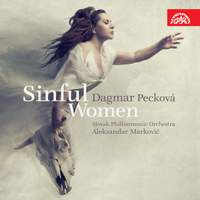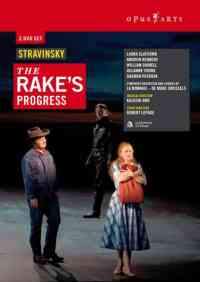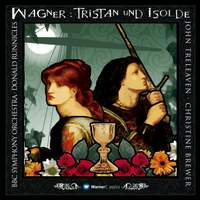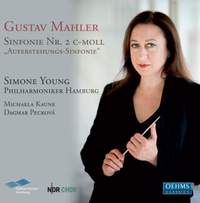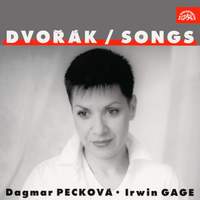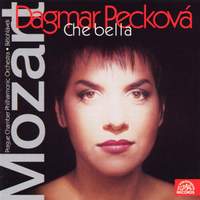Interview,
Dagmar Pecková's Sinful Women
 It's often said that dramatic mezzos spend most of their careers playing 'witches and bitches', and for her latest project on Supraphon Dagmar Pecková (acclaimed for her Strauss and Wagner roles as well as for her Mahler on the concert-platform) has embraced this idea and run with it - her rogues' gallery on Sinful Women includes mainstream operatic temptresses such as Saint-Saëns's Dalila, Wagner's Kundry, Strauss's Klytaemnestra and Massenet's Herodias, as well as comparative rarities like Massenet's Marie Madeleine and Antoine Mariotte's Salomé.
It's often said that dramatic mezzos spend most of their careers playing 'witches and bitches', and for her latest project on Supraphon Dagmar Pecková (acclaimed for her Strauss and Wagner roles as well as for her Mahler on the concert-platform) has embraced this idea and run with it - her rogues' gallery on Sinful Women includes mainstream operatic temptresses such as Saint-Saëns's Dalila, Wagner's Kundry, Strauss's Klytaemnestra and Massenet's Herodias, as well as comparative rarities like Massenet's Marie Madeleine and Antoine Mariotte's Salomé.
Our thanks to Supraphon and their UK distributor RSK for kind permission to share this candid interview with Dagmar Pecková, in which she discusses the genesis of the project, the dramatic mezzo's affinity with tormented and conflicted characters, and her own personal explorations of spiritual darkness.
You have said that the overwhelming majority of mezzo-soprano roles are sinful women! Is that really the case?
Yes, it is; though I don’t know why. Perhaps it is down to the timbre. Granted, there are also a few similarly dramatic soprano roles, but they are far more common for the mezzo-soprano. The mezzo-soprano is more capable of expressing dark states of mind, depicting various nuances of human perception, and is thus actually directly predetermined for the roles of sinful women and dramatic characters. When we juxtapose mezzo-soprano characters, we find they really are such: either temptresses or murderesses. And so I plunged into the project headlong!
Whether we like it or not, sinful women do allure us. The types who will not yield to anyone or anything. There is something exciting about it. And similarly exciting is your album...
I do hope so. Only one of the woman featured on the album somewhat differs from the other sinners. She is, I would say, a “soprano positive” role: Mary Magdalene, a redeemed sinner, is the only one of them to see the way out in forgiveness, baptism and continuation of a commenced journey. All the others are sinful, salacious, lascivious, murderesses of their husbands or children. That’s where the drama is. And with the exception of Medea, all of them are punished.
Did you find anything in the characters you yourself can identify with?
Well... I have never gone as far as to slay my husband with an axe in the bathroom or kill my children in a flush of extreme emotions. Although I have been tempted! (laughs) But when you take the Ancient times, all the great tragedies, by Sophocles and Euripides, and the great biblical stories, and transfer them to the present, everything is there! We live in modern times, we have everything we could desire, so we should be in good nick. Nevertheless, people often can’t see any other way out than suicide or murder. Or torturing and abusing children. We haven’t learnt from history in the slightest. And, in point of fact, we aren’t even overly interested. When you ask today who Clytaemnestra or Electra were, who actually knows?
So your album can also be deemed to fulfil an educational purpose?
To some extent. I would like to say to the listeners that one can progress through the soul, through forgiveness, for instance. I have been on stage for 34 years, and during that time I have passed through many a thing; I was stressed out, I got into situations when I thought I couldn’t go on any further - or I simply didn’t WANT to go on any further. But then one day I met a person who helped me immensely. He helped me purge my soul of all the deposits I talked about. The album – and the follow-up concerts – are conceived to foreground sin, forgiveness, and living for the sake of good. I wanted to show people that a seemingly hopeless situation need not be hopeless. That many difficult life situations can be tackled by means of positive thinking, forgiveness and purification of the soul.
The person you’re referring to is [the psychiatrist] Professor William Didden?
Yes. Professor Didden encountered me when I was in such a seemingly desperate situation, when I wanted to abandon singing. I was so exhausted and afflicted by the local culture community that I no longer felt like being a part of it. I had the feeling that I had nothing more to give, and I didn’t even want to give anything. I simply couldn’t go on. And Professor Didden told me: before you chuck it all in, we’ll try to do something. And he purged my soul. He gave me various literature, explained to me how to believe in myself and God. And taught me how to get in touch with my soul through meditation. He got out of me that which was deeply ingrained within me, a passion for music and a desire to mediate it to the audience. I came to understand that when you hit rock bottom, it needn’t mean that everything is over. He was one of those who made the project Sinful Women possible.
It must have been interesting to trace how different composers dealt with these dramatic and tragic stories...
Absolutely. I was interested in what manner they treated the intricate and fatal trains of thoughts running through the heads of the individual characters. Naturally, I was most interested in Strauss. In Salome and Elektra, his first two operas, they appear more markedly than in his late musical dramas. Salome and Electra are heroines of Antiquity, and dealing with their psyche is clear as daylight, and Strauss mastered it wonderfully. You can also hear it in the tone quality of the orchestra, you can literally feel when Klytaemnestra is distressed, how everything squeezes her, how it frets her soul and heart. How she can see no way out. She feels that she won’t find peace unless she kills someone, at least an animal, every day. And in the end, her soul doesn’t actually find peace. In large part because she tries to wash away blood with blood. Yet, on the other hand, her sins are well-founded. And similarly engrossing, dramatic, and challenging to render artistically, are the other characters. Every coin has two sides. I was really excited about discovering all these matters. Sinking into them, then giving voice to and expressing them in some way. Even though I had neither a mask, nor a costume, nor a stage while doing so.
What was it like to work on the recording with the Slovak Philharmonic Orchestra?
Absolutely marvellous. I know the Slovak Philharmonic back from the time when I performed with them in Bratislava during the opening of the revamped Reduta building. I arrived at a rehearsal and it was totally different to that which I had experienced in Prague. They in Slovakia liked me and, what’s more, they proved to be first-class musicians. They played splendidly, at the same time showing humility to the performed pieces. It was a great experience. So, when the idea of this CD occurred, I addressed the Slovak Philharmonic. Following certain troubles with the conductor, who ultimately gave it up, Aleksandar Markovič undertook the matter, and I was truly excited by him. He knew the scores and was 500% ready. And he profoundly felt the music.
Sinful Women was released on Monday on Supraphon.
Available Formats: CD, MP3, FLAC
Other recordings featuring Dagmar Pecková
Pecková's Baba the Turk in Robert Lepage's 1950s Vegas-themed Rake was described as 'show-stealing' by the Gramophone Guide.
Available Format: 2 DVD Videos
Pecková is Brangäne on Donald Runnicles's 2006 recording of Tristan, with John Treleaven and Chrstine Brewer in the title-roles.
Available Formats: MP3, FLAC
Reviewing Simone Young's Resurrection Symphony with the Philharmoniker Hamburg, BBC Music Magazine observed that 'Urlicht' was 'nobly enhanced by Dagmar ecková's deep contralto timbre'.
Available Formats: CD, MP3, FLAC
The Gramophone Guide 2010 described Pecková's as 'an ideal voice, unmistakably Slavonic in timbre, yet firm and pure as well as rich' on this recording of the Biblical Songs, Gypsy Melodies and Liebeslieder with pianist Irwin Gage.
Available Formats: CD, MP3, FLAC
Pecková's last operatic recital-disc for Supraphon shows her in lighter repertoire, including glimpses of both Donna Elvira and Zerlina, Sesto and Vitellia, Dorabella and Cherubino.
Available Formats: CD, MP3, FLAC


